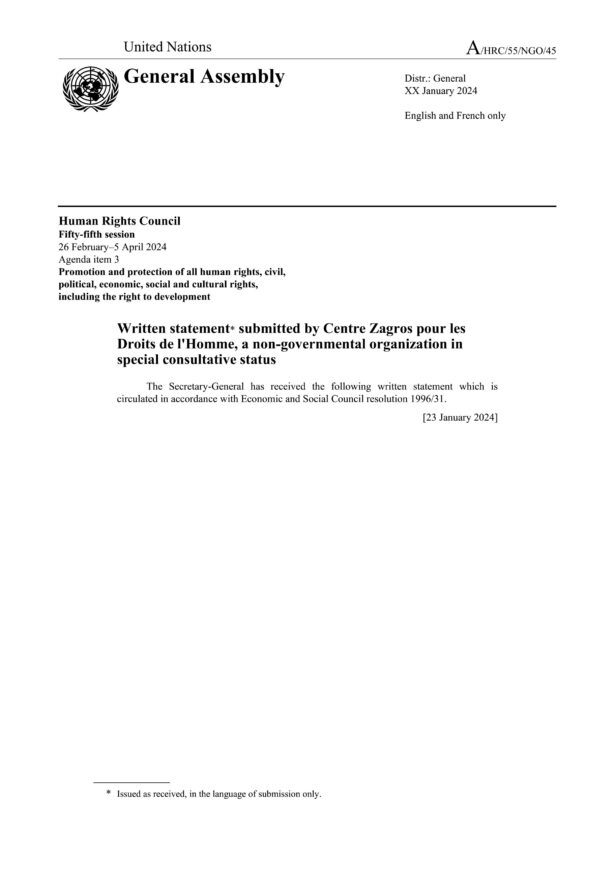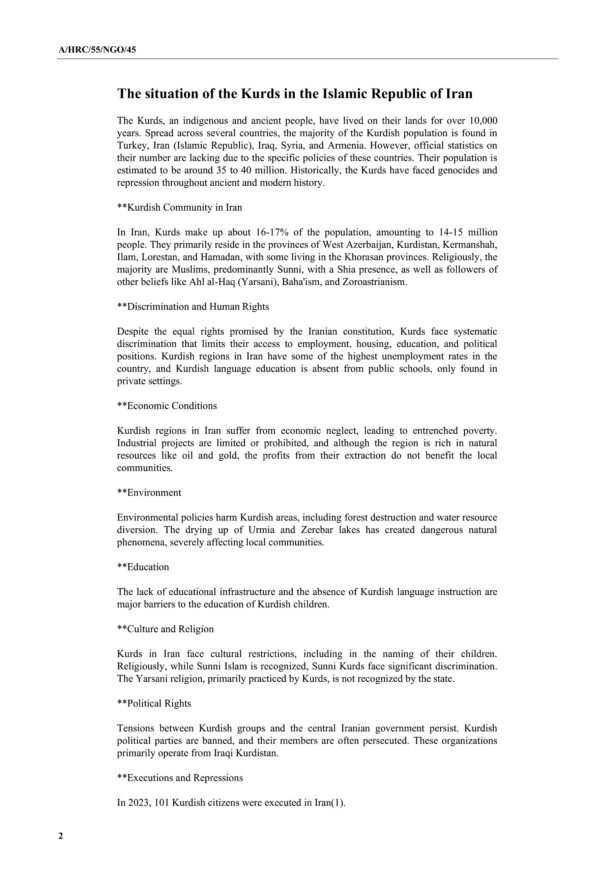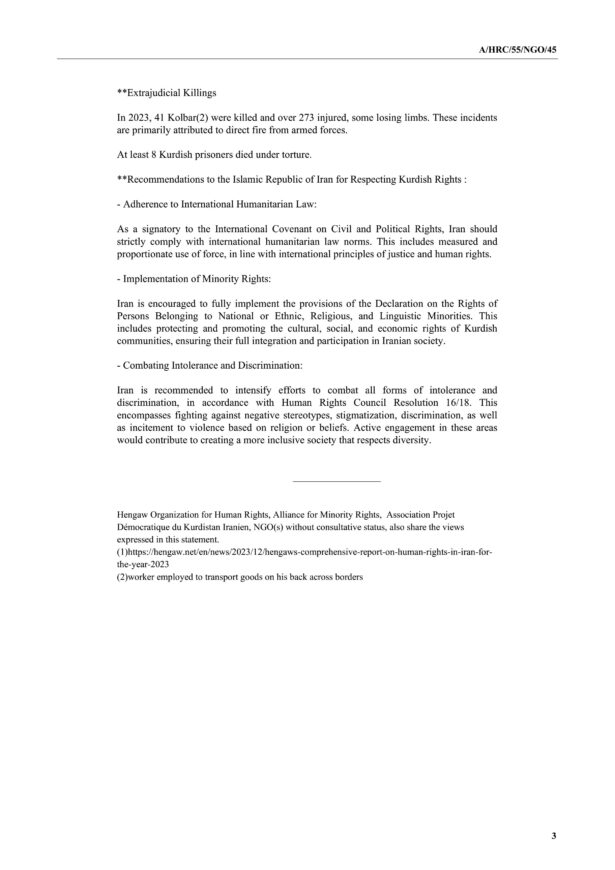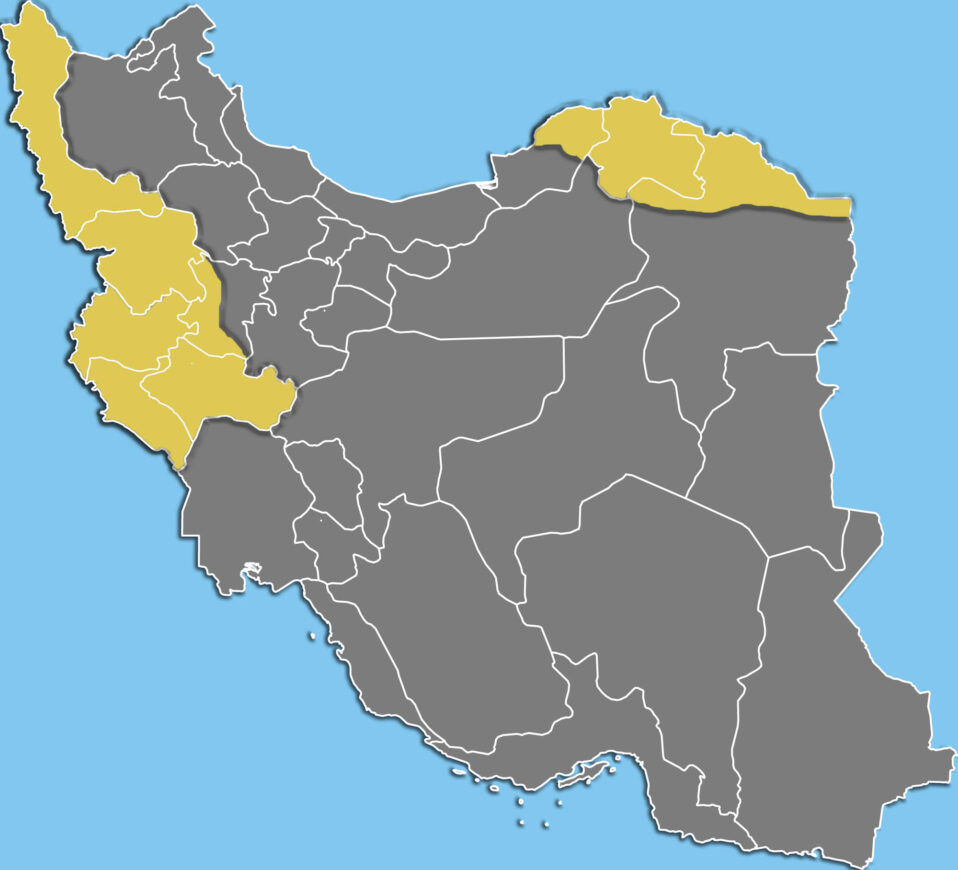Human Rights Council
Fifty-fifth session
26 February–5 April 2024
Agenda item 3
Promotion and protection of all human rights, civil,
political, economic, social and cultural rights,
including the right to development
Written statement* submitted by Centre Zagros pour les Droits de l’Homme, a non-governmental organization in special consultative status
The Kurds, an indigenous and ancient people, have lived on their lands for over 10,000 years. Spread across several countries, the majority of the Kurdish population is found in Turkey, Iran (Islamic Republic), Iraq, Syria, and Armenia. However, official statistics on their number are lacking due to the specific policies of these countries. Their population is estimated to be around 35 to 40 million. Historically, the Kurds have faced genocides and repression throughout ancient and modern history.
**Kurdish Community in Iran
In Iran, Kurds make up about 16-17% of the population, amounting to 14-15 million people. They primarily reside in the provinces of West Azerbaijan, Kurdistan, Kermanshah, Ilam, Lorestan, and Hamadan, with some living in the Khorasan provinces. Religiously, the majority are Muslims, predominantly Sunni, with a Shia presence, as well as followers of other beliefs like Ahl al-Haq (Yarsani), Baha’ism, and Zoroastrianism.
**Discrimination and Human Rights
Despite the equal rights promised by the Iranian constitution, Kurds face systematic discrimination that limits their access to employment, housing, education, and political positions. Kurdish regions in Iran have some of the highest unemployment rates in the country, and Kurdish language education is absent from public schools, only found in private settings.
**Economic Conditions
Kurdish regions in Iran suffer from economic neglect, leading to entrenched poverty. Industrial projects are limited or prohibited, and although the region is rich in natural resources like oil and gold, the profits from their extraction do not benefit the local communities.
**Environment
Environmental policies harm Kurdish areas, including forest destruction and water resource diversion. The drying up of Urmia and Zerebar lakes has created dangerous natural phenomena, severely affecting local communities.
**Education
The lack of educational infrastructure and the absence of Kurdish language instruction are major barriers to the education of Kurdish children.
**Culture and Religion
Kurds in Iran face cultural restrictions, including in the naming of their children. Religiously, while Sunni Islam is recognized, Sunni Kurds face significant discrimination. The Yarsani religion, primarily practiced by Kurds, is not recognized by the state.
**Political Rights
Tensions between Kurdish groups and the central Iranian government persist. Kurdish political parties are banned, and their members are often persecuted. These organizations primarily operate from Iraqi Kurdistan.
**Executions and Repressions
In 2023, 101 Kurdish citizens were executed in Iran(1).
**Extrajudicial Killings
In 2023, 41 Kolbar(2) were killed and over 273 injured, some losing limbs. These incidents are primarily attributed to direct fire from armed forces.
At least 8 Kurdish prisoners died under torture.
**Recommendations to the Islamic Republic of Iran for Respecting Kurdish Rights :
– Adherence to International Humanitarian Law:
As a signatory to the International Covenant on Civil and Political Rights, Iran should strictly comply with international humanitarian law norms. This includes measured and proportionate use of force, in line with international principles of justice and human rights.
– Implementation of Minority Rights:
Iran is encouraged to fully implement the provisions of the Declaration on the Rights of Persons Belonging to National or Ethnic, Religious, and Linguistic Minorities. This includes protecting and promoting the cultural, social, and economic rights of Kurdish communities, ensuring their full integration and participation in Iranian society.
– Combating Intolerance and Discrimination:
Iran is recommended to intensify efforts to combat all forms of intolerance and discrimination, in accordance with Human Rights Council Resolution 16/18. This encompasses fighting against negative stereotypes, stigmatization, discrimination, as well as incitement to violence based on religion or beliefs. Active engagement in these areas would contribute to creating a more inclusive society that respects diversity.
Hengaw Organization for Human Rights, Alliance for Minority Rights, Association Projet Démocratique du Kurdistan Iranien, NGO(s) without consultative status, also share the views expressed in this statement.
(1)https://hengaw.net/en/news/2023/12/hengaws-comprehensive-report-on-human-rights-in-iran-for-the-year-2023
(2)worker employed to transport goods on his back across borders.



